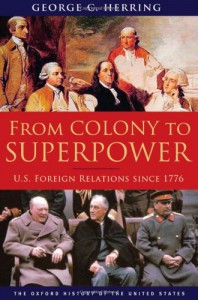A good chronicle of America’s interaction with the world

Americans have long preferred to ignore events beyond the borders of their country. Yet to adopt such an attitude, as George Herring contends in this book, is to ignore a key element of the national experience. In this book, a survey of American foreign policy from the late 18th century to the present day, Herring seeks to demonstrate the role international relations have played in shaping our nation’s history. It is one, he argues, that has been long influenced by Americans’ self-perception of themselves as a chosen people living in a nation with a unique and special place in the world. This belief often is often tempered by pragmatism, however, as Americans frequently subordinated their ideals to the realities of the situation and their own economic self interest.
These elements were present at the nation’s birth. Claiming its independence in a document filled with assertions of rights, the revolutionary government soon found itself in an alliance with France, only recently a hated foe of the colonists and an embodiment of much the revolutionaries opposed. Yet such a partnership was necessary given the United States’s weakness in the early decades of the nation’s existence, which was hardly assured. Once it was, however, the justifications of idealism and pragmatism united as U.S. foreign policy turned towards the goal of extending the nation’s borders. Americans cited their sense of national mission and destiny to explain their acquisition of new lands to themselves and others. Even the bloody internecine conflict of the Civil War slowed the country’s growth only temporarily, and by the late 19th century the focus widened from the Western Hemisphere to establishing a global presence.
The increasing economic predominance of the U.S. in the world, however, was not mirrored at first by a concomitant involvement in international politics. Though Woodrow Wilson brought to the presidency a desire to spread American ideals abroad, his effort to involve the country in the League of Nations was rejected by the public after the First World War. It was not until the Second World War that foreign policy again became a dominant concern for the American people, one perpetuated by the postwar insecurity of the Cold War. Here Herring loses the proverbial forest for the trees, as his thesis recedes amidst the details of the multifaceted struggle with the Soviet Union. Yet even the United States’s ultimate victory and its status as the world’s “hyperpower” did not offer a guarantee of safety from global threats, as the terrorist attacks of September 11, 2001 demonstrated. After examining the policies that followed the attacks, Herring concludes by arguing for an abandonment of long-held hubristic ideals and the embracing of the pragmatic tradition as the best means of addressing the U.S.’s concerns in today’s rapidly changing world.
Herring’s book is a sweeping and comprehensive account of America’s interaction with the world. Though his focus is on United States foreign policy, he addresses as well the broader relationship between its citizens and the world, a dynamic that both drives national policy and is influenced by it. His coverage is impressive, as he succeeds in addressing the major foreign policy concerns while not letting them overshadow America’s simultaneous relations with other nations. With two-thirds of his text covering American foreign policy in the 20th century, some might quibble with his emphasis on the past hundred years, yet such a focus is understandable given Herring’s background as a historian of post-Second World War policy and his narrative never bogs down in detail as a consequence. Overall, this book provides an incomparable examination of nearly two and a half centuries of American foreign policy, one that will enlighten readers familiar with the topic as well as those seeking an introduction to the subject.






